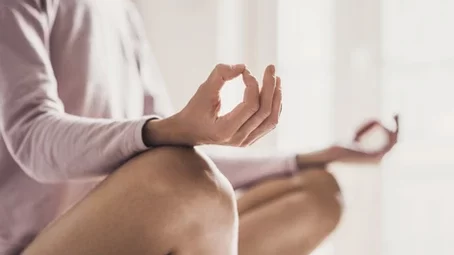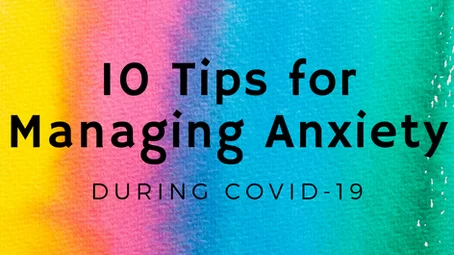Meditation has started gaining traction for a lot of people in their every day life and even moreso since we’ve all been quarantined and baseline anxiety is very understandably on the rise!
Research on meditation demonstrates that it is a very successful tool for a variety of mental health concerns, including depression, anxiety, and even PTSD. You know what else is cool about meditation? It’s free. And has no negative side effects. BOOM!
I frequently recommend meditation to clients and I know many people are looking for tools in these quaran-times to decrease anxiety and internal chaos. I love to hear it and believe that so many will find solace in utilizing meditation. But setting yourself up for success is critical to achieving that outcome. Meditation isn’t necessarily something you just decide to start doing and so you do it well (even though that’s how many people approach it). I recommend you approach it with intention, with dedication, and with an understanding that it may take some time to settle into it.

Tips & tricks from a St. Louis, MO Therapist to start the practice of meditation, so you can find it to be the helpful activity it is intended to be!
1. First and foremost, it is critical to think of meditation as “the practice of meditation.”
That shift in phrase can help you remember that it is not a stagnant activity that you either do or don’t do, but rather an activity that you get better at with time. It takes revisiting it often, experimenting with it, and sticking to it even when it’s hard, for it to become something you’re “good at.” And let me tell you: you probably won’t like it at first! I can’t stress enough how normal that is. I mean, think about it: when is the last time you, as an adult, truly did something brand new? You might not remember because it likely has been so long! But the point is, learning something brand new takes time and patience, and an understanding that it takes revisiting. It is a brand new activity so it’s very likely you will fumble at first and feel uncomfortable. That in and of itself is not an indicator that meditation doesn’t work; it is simply a sign it is new to you.
2. Speaking of “good at”, know that “successful” meditation does not necessarily mean your mind is completely quiet.
People often think that they have to quiet their thoughts to a whisper or lower to be “successful” at meditation. In reality, it is much more about getting comfortable with yourself in general and your thoughts and emotions in particular. Meditation invites us to observe our inner world with curiosity, absence of judgement, and a dose of self-compassion. Those changes often create a shift within ourselves that then create a shift in our interaction with our external environment. This shift is usually healthy—it’s the change we’ve been searching for.
3. Start with just meditation for 3-5 minutes at a time. And try for 4-5 days per week.

A longer meditation attempt when you’re just starting out can feel perhaps too frustrating or too uncomfortable, discouraging you from continuing. However, 3-5 minutes is short enough that you likely can push yourself to sit through that, and return to doing it again. Additionally, practicing it every single day when you’re just getting started may set you up for failure in that, when you miss a day, you think “ugh, I already messed up. I’m not going to keep going.” Instead, if you can practice more days of the week than not, you’re still orienting yourself to make it part of your lifestyle without holding yourself to a black-and-white standard of completing it daily.
4. Try out different times of the day!
Just like a physical workout, you may find that meditating works better for you depending on when in the day you try it. Some people love meditating first thing in the morning and others love ending their day with it. I suggest also trying mid-morning and mid-afternoon. Finding your sweet spot is important at the beginning because it will help you find success in the practice which then motivates you to keep going.
5. Try out different spots in the house!

Again, like a physical workout where you find a gym you love and helps you enjoy working out, meditating can be about finding comfort in your environment that allows you to mentally settle in. Try different rooms, different furniture, or maybe even the floor with a comfortable pillow.
6. Try different apps or videos.
Certain voices taking you through a guided meditation may irritate or encourage you. Same with the music and the words (if you are using a guided meditation). Play around and see what seems to resonate with you!
Some apps that people really like (note: some may include a pay wall to access all content):
- Calm
- Headspace
- Insight Timer
- Buddify
- 10% Happier
I also really like Gabby Bernstein’s meditations. (I linked a lot but I promise I am not affiliated!) She has a YouTube playlist of her meditations (many of them are short, making them great for beginners): https://www.youtube.com/playlist?list=PLFIWj9LkhsB57ru2-Qjm7dXdGz-IZ4wn5
Or on her website, you can sign up for instant free downloads and a newsletter which often contains a link to additional meditations: https://gabbybernstein.com/freemeditations/
And she has a meditation for these quarantine times, which can be used throughout a variety of situations: https://gabbybernstein.com/positive-energy-meditation/?inf_contact_key=7cea91f00893e8ad99653ef4ce9e330a7de27e2221fb8cb5fb9af8b43b3b84cf
There you have it! Just a few small, but critical, insights that can make your start to meditating a little smoother.
If you’re finding it very difficult to deal with your emotions or thoughts right now, or are having other symptoms of anxiety, depression, or other mental health matters and are interested in starting counseling, click here to schedule your free 15-minute consultation and we can discuss getting starting in therapy.
I wish you success in the practice of meditation because I truly believe in it as a skillset and tool for the relief from anxiety and depression so many are looking for. If you have any other questions, please feel free to let me know.
Talk to you soon!
Start Therapy for Mental Health in St. Louis
If you live in St. Louis and are ready to improve your mental health, we are here to help.
Contact Us!

Additional Counseling Services at Marble Wellness in St. Louis, MO and Chicago, IL
Counseling services designed to help set you on a path of living a more fulfilled, calm, and happy life.
St. Louis
Our St. Louis team of therapists have a variety of training backgrounds and areas of expertise. We specialize in anxiety, depression, grief, chronic illness, therapy for men, couples, and maternal overwhelm. We can also help new moms with various postpartum concerns, moms in the thick of parenting, and moms with teens. We can also chat from wherever you are in the state with online therapy in Missouri and online therapy in Illinois. No matter where you are in your journey, we would love to support you.
Chicago
Our Chicago team of therapists offer a wide range of mental health services to help our clients through the different challenges and hurdles in their life. In addition to anxiety, depression, grief, therapy for men, and maternal overwhelm, we are specialized in professional burnout, therapy for breakups, and love partnering with working moms.



